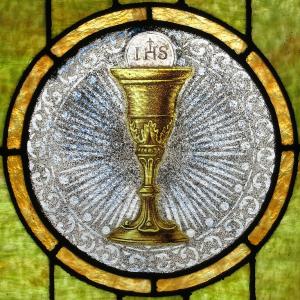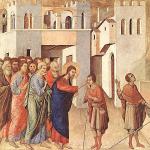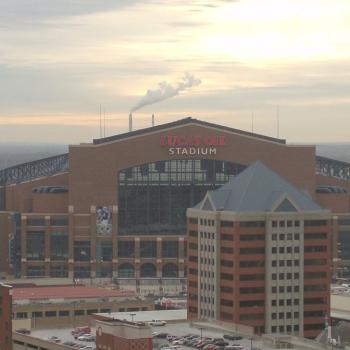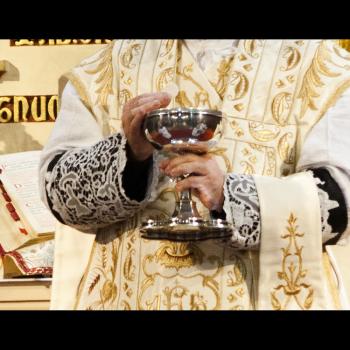
While the church of Christ exists in history as an institution, we must make it clear that the institution is not in itself the that church. Rather, the church of Christ subsists in the institution; the two are intimately connected, which is why, through participation with the institution, we are able to participate in in and find ourselves within the church of Chris. Nonetheless, it is possible for someone to be within the church of Christ without being a part of, or being estranged from, the institutional church. The relationship between the two is important, and if it is not properly understood, then equivocations emerge, such as is found with those who misinterpret the statement “outside of the church, there is no salvation,” as meaning outside the institutional church. It is erroneous to believe those words mean the institutional church, because if they did, it would mean those who were born before it existed, or live in a location where its existence is unknown, or those who find themselves unjustly kicked out of it, or unable to join it because of abuses they find happening in it, would not be able to be saved, and that would be unjust.
Sergius Bulgakov says the importance of the institution lies in the way it makes the presence of the church of Christ, the body of Christ, manifest in history, even as it is where Christ’s sacraments are to be found:
The Church is the mystery of the world, which is manifested as sacraments. Therefore, sacrament can be most generally defined as the manifested action of the Church in man. Man is the temple, the sanctuary, the priest, the bringer of sacrifice, and the receiver of sacrifice. The Church herself, the sacrament of sacraments, is not a particular institution, as each of the specific sacraments are. Rather, she is, on the one hand, a sacred fulfillment, the fulfillment of God’s original design, of “the dispensation of the mystery, which from the beginning of the world had been hid in God” (Eph. 3:9). On the other hand, she is the unique and supreme reality of Divine-humanity, revealed by Christ expressly at the Last Supper. The is the sacramental attestation to the Incarnation; the institution of the sacrament of the Eucharist is a manifestation of or attestation to the Incarnation. The mystery of the Church, this sacrament of sacraments, precedes and grounds the sacraments. [1]
Those who partake of the eucharist, which is the body of Christ, become what they eat. That is, they become the church through it, for the church is the body of Christ. The eucharist is the gift of Christ to the institution by which the institution can share Christ with others, but in doing so, the institutional church finds itself transcending itself, revealing the church of Christ which subsists in it, through communion:
We can now return to the Eucharist, for it is indeed the very act of passage in which the Church fulfills herself as a new creation and therefore, the Sacrament of the Church. In the Eucharist, the Church transcends the dimensions of “institution” and becomes the Body of Christ. It is the “Eschaton” of the Church, her manifestation as the world to come.[2]
Schmemann’s point is rather important; the eucharist is eschatological, for in and through it, we find ourselves transcending the temporal moment and partaking of eschatological glory, even if we do so in a way which, for us, includes symbols. This shows us that as with all eschatological engagement in time, we encounter the eschatological paradox of the “already” and “not yet”:
The insistence by the Orthodox on the epiclesis is nothing else, in its ultimate meaning, but the affirmation that the consecration, i.e., the transformation of bread and wine into the Body and Blood of Christ, take place in the “new aeon” of the Holy Spirit. Our earthly food becomes the Body and Blood of Christ because it has been assumed, accepted, lifted up into the “age to come” where Christ is indeed the very life, the very food of all life and the Church in His Body, “the fullness of Him that fills all in all” (Eph 1:23). [3]
The eschatological sign points the institutional church beyond itself, reminding the institution that it is but a sign and representation of the transcendent church which subsists in it. The eschatological kingdom of God “breaks” through into the world in and through the institution while reminding us the role and service of the institution:
The Eucharist of Christ and Christ the Eucharist is the “breakthrough” that brings us to the table in the Kingdom, raises us to heaven, and makes us partakers of divine food. For eucharist-thanksgiving and praise – is the very form and content of the new life that God granted us when in Christ He reconciled us to Himself. [4]
The institution should not get in the way of its purpose. Sadly, when it does so, when it takes itself too seriously, it ends up justifying all kinds of abuse, and not only that, it ends up demanding that those who experience such abuse to not deal with it properly, often threatening those who plan to expose such abuse. In doing so, it create further, and worse abuse. This is not to say the institution has no value, as it has tremendous value. Rather, that value becomes obscured by institutional abuse. Those who experience abuse find it difficult, if not impossible to experience the transcendence which the institutional church should lead to, and so it is understandable why they depart from the institution while remaining open to Christ. They have not left Christ, but the institution, though of course, they risk doing more and abandoning Christ if they are not careful. For it is important to remember that, despite such abuses, God can and still uses the institutional church to provide the sacraments, to provide all kinds of graces to those within it, especially if they are struggling against those abuses. Donatism is wrong when it asserts otherwise. Nonetheless, it is imperative for the institution to reform itself, to make sure it recommits itself to the way of Christ every time it finds itself straying from that way, which is what happens when it ignores such abuses. Finally, we must remember God is not bound by the sacraments; the graces given in and through them, and therefore through the institution, can be given in other ways; keeping this in mind will help the institution even more, so that it does not portray itself in a way as it alone provides the means of salvation. For it is God, not the institution, who saves us. The institution is said to save us only as God uses it as an instrument for our salvation.
[1] Sergius Bulgakov, Bride of the Lamb. Trans. Boris Jakim (Grand Rapids, MI: William B. Eerdmans Publishing Company, 2002), 273.
[2] Alexander Schmemann, “Theology and the Eucharist” in Liturgy and Tradition: Theological Reflections of Alexander Schmemann. Ed. Thomas Fisch (Crestwood, NY: St Vladimir’s Seminary Press, 2003),78.
[3] Alexander Schmemann, “Theology and the Eucharist,” 83.
[4] Alexander Schmemann, For The Life Of The World (Crestwood, NY: St Vladimir’s Seminary Press, 2002), 39.
Stay in touch! Like A Little Bit of Nothing on Facebook.
If you liked what you read, please consider sharing it with your friends and family!
N.B.: While I read comments to moderate them, I rarely respond to them. If I don’t respond to your comment directly, don’t assume I am unthankful for it. I appreciate it. But I want readers to feel free to ask questions, and hopefully, dialogue with each other. I have shared what I wanted to say, though some responses will get a brief reply by me, or, if I find it interesting and something I can engage fully, as the foundation for another post. I have had many posts inspired or improved upon thanks to my readers.

















